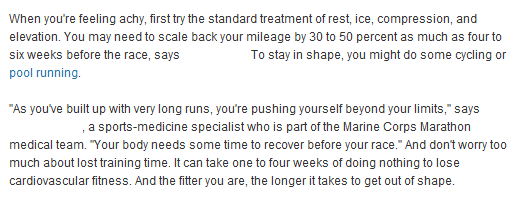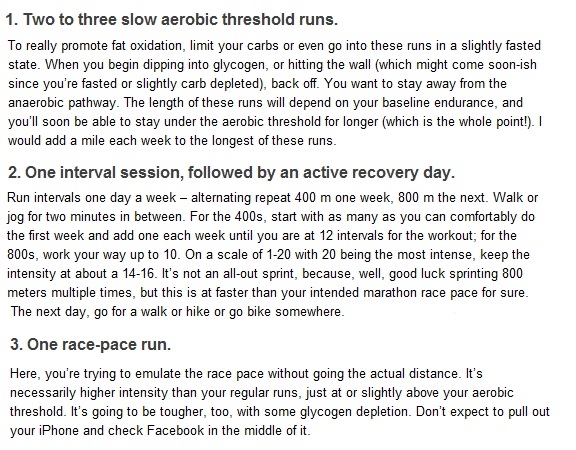As you probably know, I am a huge running nerd. I read more running blogs, books, studies, and articles than is reasonable or necessary.

While studies on lifting and running form don’t impress my wife, they help me design better training plans for my runners and write better articles here on Strength Running. I wasn’t always so immersed in running, though.
In 2008 after my 2:44 marathon at New York City, I was injured for six months with ITBS. After a period of eating cookies on my couch and watching reruns of House, I stopped feeling sorry for myself and took action. I got proactive and started researching the best treatment options for my injury.
I also discovered the latest running theories that were influencing the training of the world’s fastest runners. These principles can also be applied to everyone else – so I started experimenting and tweaking my running. I added workouts, changed my mindset, and transformed my training from what it was before my injury.
Now, I’ve been injury-free for three years and I just took over five minutes off my marathon PR, running 2:39:32 at the Philadelphia Marathon. Many of the new training principles I learned have helped other runners, like Lisa and Kris:
“This year I’ve PR’d at every distance that I’ve run: 5K, 10K, half-marathon, and Marathon! And I’m sure there is more out there for me in this Year of the PR. Best decision I ever made was to hire you! 🙂 – Lisa G., CA
“Jason, not sure what kind of mystical powers you have, but I ran a 5k this morning and cut 40 seconds off my PR!” – Kris B., CT
While I would love to have mystical powers, my talents are limited to a good understanding of sound training.
Unfortunately, a lot of what I read is just nonsense. There is training advice that tells you never to run longer than 90 minutes for the marathon! Here’s a free tip: if you do that, you will never run to your potential in the marathon, much less qualify for Boston.
This is What Passes for Mainstream Marathon Advice
I’ve done a lot of research to find what’s available to you for marathon resources. Some of it is shockingly bad. Let’s get it over with:
1. Do “speed work”… on a track!


Aside from the patronizing tone, we have a bad workout and “so what?” advice here. This is from an article on “marathon drills” and did not include one drill. Tips like these aren’t going to help you one bit – you’ll likely forget them the very next day.
2. This is what injury prevention advice is like on other sites:

Aggressive injury treatment is much more effective at treating aches and pains than resting and all the other generic injury advice you’ll find. This advice isn’t necessarily bad, just don’t expect it to make you feel much better. And in the long-term, you’re not treating the cause of your injury.
The second thing wrong with this marathon training tip is more insidious: it’s the belief that taking time off from running and just doing things like cycling or pool running will keep you prepared to race well. Maybe in the extreme short-term, like a week or two. You’ll stay in good aerobic shape – but this article fails to mention your structural fitness erodes much more quickly than your endurance.
Structural, or mechanical, fitness is the durability of your muscles, bones, tendons, and ligaments to withstand the impact forces of running. If you’re cutting your mileage by 50% and doing non-impact exercise the rest of the time, your ability to withstand the mechanical shock of running a marathon is going to leave your legs overly sore – and likely injured.
3. Marathoning in 3 Easy Steps

Marathon training this simple is going to leave you injured, frustrated, exhausted, and slow. Few runners can run a successful marathon on three days of training per week – even if it’s designed a lot better than these suggestions. No long run? I’m speechless.
Why Are These Marathon Tips So Bad?
The problem with all of these examples is that they are broad and over-generalized. Who should listen to them? Someone who’s never run before or a runner with a 4 years of structured running behind them? Unfortunately, most of these tips are simple tactics. There’s no system or support to help you along. They’re not part of a cohesive plan geared to your fitness level.
They leave you floundering for the next great tip. You try a workout from this article, a core exercise from this website, and an injury prevention tactic from another article. Five weeks later you’ve done a lot of random stuff and you’re in the same spot you started.
This upsets me because these suggestions are on some of the largest running and fitness websites in the world. The most visited websites on the internet are recommending you do virtually worthless workouts for the marathon. This advice is unspecific, dangerously over-generalized, and clearly written for the lowest common denominator.
Are you mad? I am outraged.
These tips prompt runners to tell me things like:
“I have tried some exercises but I was never sure whether or not it was actually doing anything for me”
“My ‘plan’ is cobbled together from the various sources I’ve found online and I would LOVE to have some personalized coaching as I’ve never been an active person and know next to nothing about running.”
I cringe when runners tell me that they put a plan together from a bunch of internet sources. We’ve seen today that what’s available online is misleading at best and downright dangerous at worst. Is that how you’re going to run a fast marathon?
It’s no wonder that runners are feeling lost and have no direction in their running. They end up running too much, too soon, too fast and get hurt. Or they burn out and feel overwhelmed, like training for a marathon isn’t sustainable. It is, you just have to train with a plan.
I hope that over the last two years I’ve provided better information than most sources. I think I have and I’m not the only one:
I’m one of the new-as-of-2011 readers, and very glad to be on the growing bandwagon. Way better than a Runner’s World subscription! – Alex B.
Most marathoners are looking for a personalized plan that will get them to the starting line feeling fresh, fit, and ready to race fast. But most runners spend all day reading random websites (with crappy advice like above) wondering what they should do next. They think, “I just need to figure out a weekly plan and avoid injury.”
Sound familiar?
How Run Your BQ is Different
If you’re looking for another article with generic tips on what pair of shoes to buy, then RYBQ is not for you. The funny thing is, good runners are doing some damn good training out there – but the major running outlets don’t highlight that training. You have to search for it hard and it’s not that accessible.
Run Your BQ is going to change that. Plus, we’re including more support and coaching guidance than you can shake a stick at.
Matt Frazier (of No Meat Athlete) and I have spent hundreds of hours building this website. It has one goal: to get you to run a Boston Qualifying marathon time. There’s enough worthless advice out there, so we’re not going to tell you to rest after every run or to eat a bagel to carb up before a long run.
Our focus is on results – helping you gain endurance, prevent injuries, and build your mileage safely. We want you to run faster and experience the thrill of qualifying for Boston. Instead of a single training plan and general tips, we’re building a system to guide you from the beginning of your training all the way to Hopkinton.
Are you ready?
Run Your BQ is going to cover a lot of ground. You’ll learn how to balance mileage and fast workouts, pick the right training program from our library of plans, what to eat during your training (for both pre-workout fuel and post-workout recovery), and the most important part of marathon training.
And that’s just the tip of the iceberg. The most valuable part of RYBQ is that you’ll be able to connect with other members to ask questions, give feedback, provide support, and motivate each other through the middle weeks of marathon training.
We’re opening this up soon so stay tuned. Until we do, don’t miss any of the private marathon reports we send out. Sign up here if you want in.
We’ll send you The BQ Blueprint and even more resources to help you run a better marathon – for free.